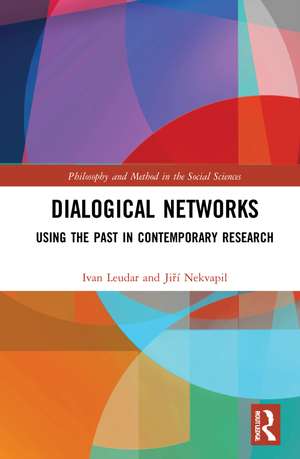Dialogical Networks: Using the Past in Contemporary Research: Philosophy and Method in the Social Sciences
Autor Ivan Leudar, Jiří Nekvapilen Limba Engleză Paperback – 25 sep 2023
| Toate formatele și edițiile | Preț | Express |
|---|---|---|
| Paperback (1) | 389.88 lei 6-8 săpt. | |
| Taylor & Francis – 25 sep 2023 | 389.88 lei 6-8 săpt. | |
| Hardback (1) | 1006.43 lei 6-8 săpt. | |
| Taylor & Francis – 28 mar 2022 | 1006.43 lei 6-8 săpt. |
Preț: 389.88 lei
Nou
Puncte Express: 585
Preț estimativ în valută:
74.60€ • 77.89$ • 61.74£
74.60€ • 77.89$ • 61.74£
Carte tipărită la comandă
Livrare economică 05-19 aprilie
Preluare comenzi: 021 569.72.76
Specificații
ISBN-13: 9781032150963
ISBN-10: 1032150963
Pagini: 324
Dimensiuni: 156 x 234 x 17 mm
Greutate: 0.46 kg
Ediția:1
Editura: Taylor & Francis
Colecția Routledge
Seria Philosophy and Method in the Social Sciences
Locul publicării:Oxford, United Kingdom
ISBN-10: 1032150963
Pagini: 324
Dimensiuni: 156 x 234 x 17 mm
Greutate: 0.46 kg
Ediția:1
Editura: Taylor & Francis
Colecția Routledge
Seria Philosophy and Method in the Social Sciences
Locul publicării:Oxford, United Kingdom
Public țintă
PostgraduateCuprins
1. Introduction 2. Reporting Political Arguments 3. Reflection 1: The First Steps – From ‘Context Selection’ to Dialogical Networks 4. On the Emergence of Political Identity in Czech Mass Media: The Case of Democratic Party of Sudetenland 5. On Dialogical Networks: Arguments about the Migration Law in Czech Mass Media in 1993 6. On Membership Categorisation: ‘Us’, ‘Them’and ‘Doing Violence’ in Political Discourse 7. Reflection 2: On Historical Contextualisations in Dialogical Networks Project 8. The War on Terror and Muslim Britons’ Safety: A Week in the Life of a Dialogical Network 9. Reflection 3: Continuities, Novelties and Dissociations 10. Practical Historians and Adversaries: 9/11 Revisited 11. A Day in the Life of a Dialogical Network – The Case of Czech Currency Devaluation 12. Reflection 4: Multiplication and Emergent Meanings 13. Conclusion
Recenzii
"Leudar and Nekvapil provide both a comprehensive discussion of dialogical networks and a historical examination of how the notion developed. An authoritative text on how social interactions and events get publicly reported, and hence transformed, across space and time."
Ray Wilkinson, Professor of Human Communication, University of Sheffield, UK
"This impressive and broad-ranging book illuminates the importance of historical contextualizations of research in social sciences. Central to this project is the concept of dialogical networks showing how identity, stereotype, and prejudice are reported in interactions of everyday talk, and how continuities, changes and disruptions take place over time."
Ivana Markova, University of Stirling, UK
"This is a must read for anyone interested in dialogical networks. Ivan Leudar and Jiri Nekvapil apply their innovative theoretically and methodologically expansive approach to unpack how we - as everyday historians - bring the past into our present and make this consequential. This is not done as an end in its own right but to address controversial social issues such as how social identities are managed, attempts to change these identities and the real consequences of these practices (e.g. Restricting Roma’s freedom of abode and movement)."
Rose McCabe, City, University of London, UK
"This very innovative book presents both a collection of master pieces on the concept of dialogical networks, and a reflexive history of an aspect of the social sciences in the making. As such, it is a major resource for senior and junior scholars who will find substantial information as well as epistemological thoughts regarding the practice of research."
Baudouin Dupret, CNRS, France/UCLouvain, Belgium
Ray Wilkinson, Professor of Human Communication, University of Sheffield, UK
"This impressive and broad-ranging book illuminates the importance of historical contextualizations of research in social sciences. Central to this project is the concept of dialogical networks showing how identity, stereotype, and prejudice are reported in interactions of everyday talk, and how continuities, changes and disruptions take place over time."
Ivana Markova, University of Stirling, UK
"This is a must read for anyone interested in dialogical networks. Ivan Leudar and Jiri Nekvapil apply their innovative theoretically and methodologically expansive approach to unpack how we - as everyday historians - bring the past into our present and make this consequential. This is not done as an end in its own right but to address controversial social issues such as how social identities are managed, attempts to change these identities and the real consequences of these practices (e.g. Restricting Roma’s freedom of abode and movement)."
Rose McCabe, City, University of London, UK
"This very innovative book presents both a collection of master pieces on the concept of dialogical networks, and a reflexive history of an aspect of the social sciences in the making. As such, it is a major resource for senior and junior scholars who will find substantial information as well as epistemological thoughts regarding the practice of research."
Baudouin Dupret, CNRS, France/UCLouvain, Belgium
Notă biografică
Ivan Leudar is Emeritus Professor of Historical Psychology in the School of Biological Sciences at the University of Manchester, UK. He is the author of Voices of Reason, Voices of Insanity and co-editor of Against Theory of Mind and Conversation Analysis and Psychotherapy.
Jiří Nekvapil is Associate Professor of Sociolinguistics in the Faculty of Arts at Charles University, Prague, Czech Republic. His research has been influenced by poststructuralist linguistics and ethnomethodology.
Jiří Nekvapil is Associate Professor of Sociolinguistics in the Faculty of Arts at Charles University, Prague, Czech Republic. His research has been influenced by poststructuralist linguistics and ethnomethodology.
Descriere
Bringing together two decades of work by the authors, this book shows how the concept of the dialogical network developed and outlines the key characteristics of dialogical networks, demonstrating the importance of historical contingency in our knowledge of them and highlighting the fact that ‘doing history’ is part of research.







